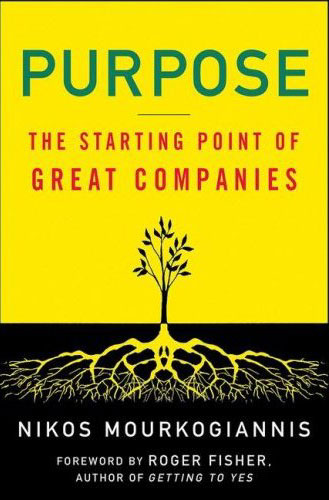
Purpose: The Starting Point of Great Companies
Just read an article on WWD about this book pretty interesting…
“If you want to make it really big, it is important to remember what you stand for,” counseled author-consultant Nikos Mourkogiannis, whose new book, “Purpose: The Starting Point of Great Companies” (Palgrave Macmillan: $27.95), draws on the works of philosophers in citing four purposes he contends would propel just about any business to take action — including the purpose of heroism, an aim traditionally embodied in uniforms.”
Topshop may be straying from that purpose, though, in its deal with model Kate Moss to help create and design a collection for it, starting in spring 2007, Mourkogiannis said when asked to appraise the arrangement. Acknowledging Topshop’s notion of Moss as someone who embodies the style of the chain’s customers, the author still said he thinks the idea lacks credibility. “What in her background makes her a fashion designer? Is she going to greet customers at the door (to put a stamp of) authenticity on the apparel?” he asked in referring to the collection, Kate Moss for Topshop, which will make its debut at the company’s 308 stores and online at topshop.com.
Although Topshop and Zara are flourishing as quick (fashion) change artists, the author-consultant cautioned an approach built on speed to market is no guarantee of success. “The world is not a simple place; not everything moves fast. Just to go fast is not an advantage,” he contended. “If that is all there is, there is only one kind of company that will win — a low-cost producer.” – wwd
Read the whole article after the jump…
Keeping a Constant Aim Amid Fashion’s Quick Change
By Valerie Seckler
“If you want to make it really big, it is important to remember what you stand for,” counseled author-consultant Nikos Mourkogiannis, whose new book, “Purpose: The Starting Point of Great Companies” (Palgrave Macmillan: $27.95), draws on the works of philosophers in citing four purposes he contends would propel just about any business to take action — including the purpose of heroism, an aim traditionally embodied in uniforms.
“Both heroes and villains wear uniforms,” Mourkogiannis observed, citing men and women in the military, among other services, as well as prison inmates. “We used to have many more uniforms in the world. The heroic, which was important for the industrial age, is receding” as everyday people are empowered in the information age, the author said in an interview.
Such conditions are likely to breed a greater openness to wearing different kinds of apparel among people worldwide, and subsequently, Mourkogiannis foresees “more opportunities for fashion.”
That said, the only way for fashion or any business to win in today’s fast-moving, pragmatic world is by sticking to a purpose, advised Mourkogiannis, who loves a big concept and regularly draws from the philosophies of Aristotle, David Hume, Søren Kierkegaard and Friedrich Nietzsche in talking about various ways to anchor and energize a business.
In his book, published this month, the author associates the philosophy of Kierkegaard with the purpose of discovery, the philosophy of Aristotle with the aim of excellence, the thinking of Hume with altruism and that of Nietzsche with heroism. He considers three of those purposes apt ones for 21st-century businesses — excellence, which he believes is emblematic of such brands as Chanel, Charvet, Apple and The Economist; altruism, symbolic of Zara, Nordstrom and The Body Shop, and discovery, which informs Topshop, Virgin and Sony.
One reason Mourkogiannis, a senior partner at business consultant Panthea, draws from the ideas of philosophers is his belief, as he states in his book, that “purpose in companies is most effective when it draws on moral ideas that have stood the test of time. To build a business that lasts, one does well to draw on ideas that have lasted.”
The moral basis for action that informs the purpose of discovery, he writes, is “I have freely chosen it;” for excellence, it is “It constitutes fulfillment,” and for altruism, it is “It increases happiness.”
Two of Mourkogiannis’ favorite examples of fashion marketers with a clarity of purpose are Zara, whose purpose he perceives as altruism, and Topshop, whose purpose he sees as one of discovery. “Their purposes and business models are very consistent; their purposes are very well aligned with their strategy, systems, structure,” he said in the interview.
Zara’s altruism, he noted, is reflected in the brand’s well-chronicled success in creating new, moderate-price fashion goods for consumers in just two weeks, via a design and manufacturing operation based almost entirely in Spain. About 85 percent of Zara’s fashion items are purchased by consumers at full price in the brand’s 942 stores, compared with the fashion sector’s average of 60 percent, Mourkogiannis said, citing figures published recently in BusinessWeek.
While Zara and Topshop are both built, in part, on frequent deliveries of fresh apparel, Mourkogiannis cited the British retailer’s devotion to setting trends, rather than following them, as signaling a different aim, that of discovery. It is expressed in the 7,000 looks Topshop is said to introduce each season, as well as in expressions of the brand like Topshop Express, which delivers products to the homes or offices of people too busy to pick them up themselves.
Topshop may be straying from that purpose, though, in its deal with model Kate Moss to help create and design a collection for it, starting in spring 2007, Mourkogiannis said when asked to appraise the arrangement. Acknowledging Topshop’s notion of Moss as someone who embodies the style of the chain’s customers, the author still said he thinks the idea lacks credibility. “What in her background makes her a fashion designer? Is she going to greet customers at the door (to put a stamp of) authenticity on the apparel?” he asked in referring to the collection, Kate Moss for Topshop, which will make its debut at the company’s 308 stores and online at topshop.com.
Although Topshop and Zara are flourishing as quick (fashion) change artists, the author-consultant cautioned an approach built on speed to market is no guarantee of success. “The world is not a simple place; not everything moves fast. Just to go fast is not an advantage,” he contended. “If that is all there is, there is only one kind of company that will win — a low-cost producer.”
These days, Mourkogiannis is less than impressed with the sense of purpose he perceives at Wal-Mart, a low-cost retailer he once considered a paragon of altruism, based on founder Sam Walton’s determination to give the customer a good deal. This was reflected, he writes, in Walton’s “desire to create the greatest amount of happiness for the largest number of people. For Walton, growing up in the relatively impoverished region of rural Arkansas, that meant helping as many people as possible raise their standard of living; giving them material goods in a homogenized but comforting atmosphere.”
“It is difficult to create a sense of altruistic community when you are so big,” Mourkogiannis said in the interview. “It is harder to be nice to an infinite number of people.” In addition, he said Wal-Mart is suffering from “lost credibility,” and he thinks “they feel the same old stuff will not work,” an observation that was confirmed by Wal-Mart spokesman John Simley.
Wal-Mart has come under pressure in recent months on different fronts, among them, lawsuits alleging unfair treatment of employees and the unionization of the 66 Wal-Mart stores in China. Wal-Mart has long sought to keep unions from organizing at its original base of stores, in the U.S.
Employees of Wal-Mart have been winning some recent challenges over working conditions they’ve complained are sub-standard, most recently in Pennsylvania, where a state court jury found the company had violated state labor laws. Simley said the company planned to appeal the verdict on more than one basis, but he did not specify. When asked whether he thought the ruling affected people’s perceptions of the company, the Wal-Mart spokesman said he did not know.
Though Mourkogiannis finds Wal-Mart’s current purpose unclear, he believes the discount giant is transforming itself into a business that could be marked by discovery, through such efforts as injecting more fashion into the chain, adding pricier items, opening in more urban locations and becoming more environmentally conscious, as evidenced by the retailer’s request that its suppliers use less packaging and its goal to be supplied 100 percent by renewable energy. Such sustainability efforts, Simley said, “started out as a matter of how we’re being perceived and turned into a business issue — reducing waste and increasing efficiency.”
To pull off this kind of change at Wal-Mart could take an investment of at least five years’ time and $100 million, Mourkogiannis projected. “To do it with any less commitment,” he added, “will result in complete confusion.”
Categories: entertainment/events
Tags:










